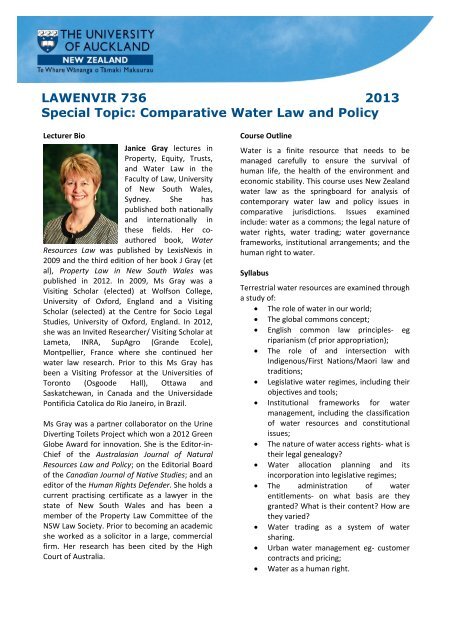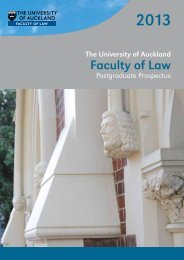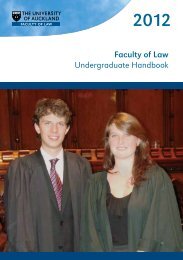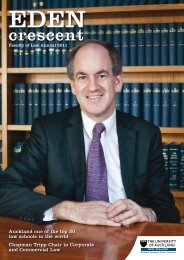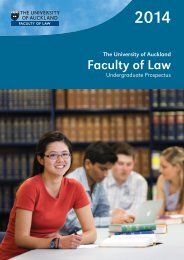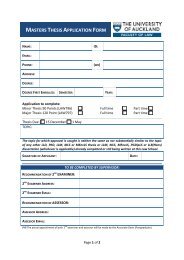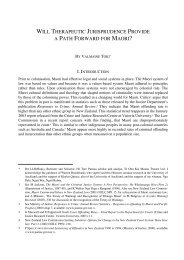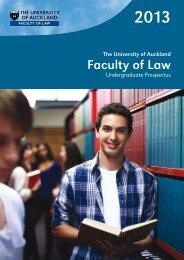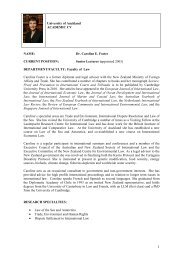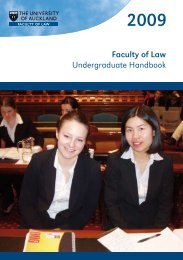Lorem ipsum dolor sit amet, consectetuer adipiscing elit, sed diam ...
Lorem ipsum dolor sit amet, consectetuer adipiscing elit, sed diam ...
Lorem ipsum dolor sit amet, consectetuer adipiscing elit, sed diam ...
You also want an ePaper? Increase the reach of your titles
YUMPU automatically turns print PDFs into web optimized ePapers that Google loves.
LAWENVIR 736 2013<br />
Special Topic: Comparative Water Law and Policy<br />
Lecturer Bio<br />
Janice Gray lectures in<br />
Property, Equity, Trusts,<br />
and Water Law in the<br />
Faculty of Law, Univer<strong>sit</strong>y<br />
of New South Wales,<br />
Sydney. She has<br />
published both nationally<br />
and internationally in<br />
these fields. Her coauthored<br />
book, Water<br />
Resources Law was published by LexisNexis in<br />
2009 and the third edition of her book J Gray (et<br />
al), Property Law in New South Wales was<br />
published in 2012. In 2009, Ms Gray was a<br />
Vi<strong>sit</strong>ing Scholar (elected) at Wolfson College,<br />
Univer<strong>sit</strong>y of Oxford, England and a Vi<strong>sit</strong>ing<br />
Scholar (selected) at the Centre for Socio Legal<br />
Studies, Univer<strong>sit</strong>y of Oxford, England. In 2012,<br />
she was an Invited Researcher/ Vi<strong>sit</strong>ing Scholar at<br />
L<strong>amet</strong>a, INRA, SupAgro (Grande Ecole),<br />
Montpellier, France where she continued her<br />
water law research. Prior to this Ms Gray has<br />
been a Vi<strong>sit</strong>ing Professor at the Univer<strong>sit</strong>ies of<br />
Toronto (Osgoode Hall), Ottawa and<br />
Saskatchewan, in Canada and the Universidade<br />
Pontificia Catolica do Rio Janeiro, in Brazil.<br />
Ms Gray was a partner collaborator on the Urine<br />
Diverting Toilets Project which won a 2012 Green<br />
Globe Award for innovation. She is the Editor-in-<br />
Chief of the Australasian Journal of Natural<br />
Resources Law and Policy; on the Editorial Board<br />
of the Canadian Journal of Native Studies; and an<br />
editor of the Human Rights Defender. She holds a<br />
current practising certificate as a lawyer in the<br />
state of New South Wales and has been a<br />
member of the Property Law Committee of the<br />
NSW Law Society. Prior to becoming an academic<br />
she worked as a solicitor in a large, commercial<br />
firm. Her research has been cited by the High<br />
Court of Australia.<br />
Course Outline<br />
Water is a finite resource that needs to be<br />
managed carefully to ensure the survival of<br />
human life, the health of the environment and<br />
economic stability. This course uses New Zealand<br />
water law as the springboard for analysis of<br />
contemporary water law and policy issues in<br />
comparative jurisdictions. Issues examined<br />
include: water as a commons; the legal nature of<br />
water rights, water trading; water governance<br />
frameworks, institutional arrangements; and the<br />
human right to water.<br />
Syllabus<br />
Terrestrial water resources are examined through<br />
a study of:<br />
The role of water in our world;<br />
The global commons concept;<br />
English common law principles- eg<br />
riparianism (cf prior appropriation);<br />
The role of and intersection with<br />
Indigenous/First Nations/Maori law and<br />
traditions;<br />
Legislative water regimes, including their<br />
objectives and tools;<br />
Institutional frameworks for water<br />
management, including the classification<br />
of water resources and constitutional<br />
issues;<br />
The nature of water access rights- what is<br />
their legal genealogy?<br />
Water allocation planning and its<br />
incorporation into legislative regimes;<br />
The administration of water<br />
entitlements- on what basis are they<br />
granted? What is their content? How are<br />
they varied?<br />
Water trading as a system of water<br />
sharing.<br />
Urban water management eg- customer<br />
contracts and pricing;<br />
Water as a human right.
Accordingly the course deals with private law<br />
concepts (eg property) and public law concepts<br />
(eg constitutional and human rights law). It also<br />
considers the blurring of the divide between<br />
public and private law in relation to water and<br />
examines the effectiveness of participatory<br />
decision-making and multi-layered governance.<br />
As a result the course is a hybrid and covers<br />
aspects of:<br />
Environmental /Natural Resources Law;<br />
Competition/Commercial Law;<br />
Property Law; and<br />
Human Rights Law.<br />
Objectives<br />
The chief objective of the course is to provide<br />
students with an introduction to a range of<br />
contemporary issues that are relevant to water<br />
law and policy in a world where water resources<br />
are under increasing pressure.<br />
The course uses New Zealand water law as a<br />
launching pad for discussion and analysis of<br />
comparative, water law and policy issues in other<br />
jurisdictions.<br />
Learning Outcomes<br />
On completion of this course students should be<br />
able to:<br />
Appreciate the importance of water as a<br />
subject for regulation and governance;<br />
Understand the key (historical) principles<br />
of English law on which many other<br />
jurisdictions ba<strong>sed</strong> their water law;<br />
Understand the key legal principles<br />
governing the management of water<br />
resources in New Zealand;<br />
Recognise and understand the main<br />
principles of selected comparative<br />
domestic water law regimes.<br />
Understand the intersection of human<br />
rights law with water governance. ;<br />
Identify and use the key legal and policy<br />
materials applied in the jurisdictions.<br />
studied; and .<br />
Comment critically on the law and policy<br />
relevant to specific water problems.<br />
Assessment<br />
90% research essay of 12,500 words and 10%<br />
class participation/presentation.<br />
Essay<br />
Each student is required to submit a research<br />
essay of no more than 12,500 words including an<br />
abstract/synopsis of 500 words. The essay is to<br />
be original work, relying on secondary and<br />
primary sources. It MUST be the work of the<br />
student. Another person other than the enrolled<br />
student MUST NOT write the essay nor do the<br />
research on behalf of the enrolled student.<br />
Further, plagiarism is not permitted and in that<br />
regard each student should read the Univer<strong>sit</strong>y’s<br />
plagiarism policy and adhere to it. All students<br />
will be expected to sign a plagiarism declaration<br />
when submitting their essays. Students must also<br />
use proper legal citations and include a reading<br />
list at the end of their type-written essay. The<br />
essay should be compri<strong>sed</strong> of properly crafted<br />
English sentences. (Note form is unacceptable.)<br />
The use of sub-headings is encouraged and<br />
footnotes rather than Harvard style in-text<br />
referencing are to be u<strong>sed</strong>.<br />
Descriptive essays are not encouraged. Instead<br />
students are expected to engage with relevant<br />
legal issues by: critiquing the law; developing<br />
proposals for reform; examining the operation of<br />
law and policy in practice; and/or providing a<br />
conceptual analysis of the law, for example.<br />
Essays must be submitted to the Faculty of Law,<br />
by 4.00 pm Thursday 9 May, 2013.<br />
Extensions will not be granted lightly (only on<br />
sickness and compassionate grounds) and must<br />
be requested formally through the Postgraduate<br />
Manager.<br />
Class Participation/Presentation.<br />
Each student will be asked to prepare a brief (15<br />
minute) answer to one of the focus questions in<br />
the Learning Guide and present this to the rest of<br />
the class. In addition, each student is expected to<br />
make individual contributions to seminar<br />
discussions. Students will be individually asses<strong>sed</strong><br />
on the quality of their contributions.
Criteria & Marking:<br />
Students will be individually asses<strong>sed</strong> on the<br />
quality of their contributions with reference to<br />
the following criteria:<br />
the extent to which the student has<br />
identified the important and relevant<br />
issues;<br />
the clarity of argument;<br />
the depth and thoroughness of<br />
understanding of the seminar material;,<br />
the strength and clarity of the arguments<br />
presented;<br />
the overall lucidity of the contribution;<br />
the extent to which issues are placed in<br />
their wider context;<br />
the extent to which the student has<br />
displayed a grasp of the doctrinal and<br />
normative issues;<br />
the analysis and synthesis of material<br />
and;<br />
<br />
the ability to draw worthwhile<br />
conclusions.<br />
Class participation will asses<strong>sed</strong> over the whole 5<br />
days of the course. Quality rather than quantity<br />
will be asses<strong>sed</strong> but clearly if a student is not<br />
present for all the classes it will be impossible to<br />
achieve the maximum marks possible even if a<br />
student’s contributions are brilliant when he/she<br />
does speak. Students are reminded that the full<br />
range of marks is available to the lecturer in<br />
assessing class participation. Please be assured<br />
that the lecturer is very aware that mistakes are<br />
part of learning. Accordingly, ‘getting the law<br />
right’ is not the key focus of the class<br />
participation component of assessment. If<br />
students knew all the law from the outset, there<br />
would be little point in them enrolling in the<br />
course. Rather, class participation is included to<br />
extend students and to assess students’<br />
imaginative understanding of, and engagement<br />
with, the materials under discussion. It is not<br />
meant to be threatening.<br />
Teaching Method<br />
The course will be taught over five days<br />
commencing on a Wednesday and concluding at<br />
the end of the following Tuesday. Classes will be<br />
interactive and hopefully very friendly. It will,<br />
however, be necessary for students to do the<br />
pre-reading for the course so that they get the<br />
most out of the materials under discussion.<br />
Classes will commence at 9am and run till<br />
4.30pm. Morning tea will be around 10.30am<br />
(approx. 20 minutes). We will also have a short<br />
break in the afternoon. On the last day of the<br />
course, the Faculty of Law, will provide a light<br />
lunch.<br />
Course Details<br />
Semester One<br />
Study mode Intensive<br />
Dates 20-26 February 2013<br />
Time 9.00am - 4.30pm<br />
Location Room 340, 1-11 Short Street<br />
Value 30 Points<br />
Contact Details<br />
Postgraduate Law Centre<br />
Level 7, 1-11 Short St<br />
s.pilkington@auckland.ac.nz<br />
Lecturer contact details: j.gray@unsw.edu.au<br />
Reading Materials<br />
Reading materials will be contained in the<br />
Casebook/Study Guide. Students may also be<br />
asked to access additional materials via the<br />
internet.


